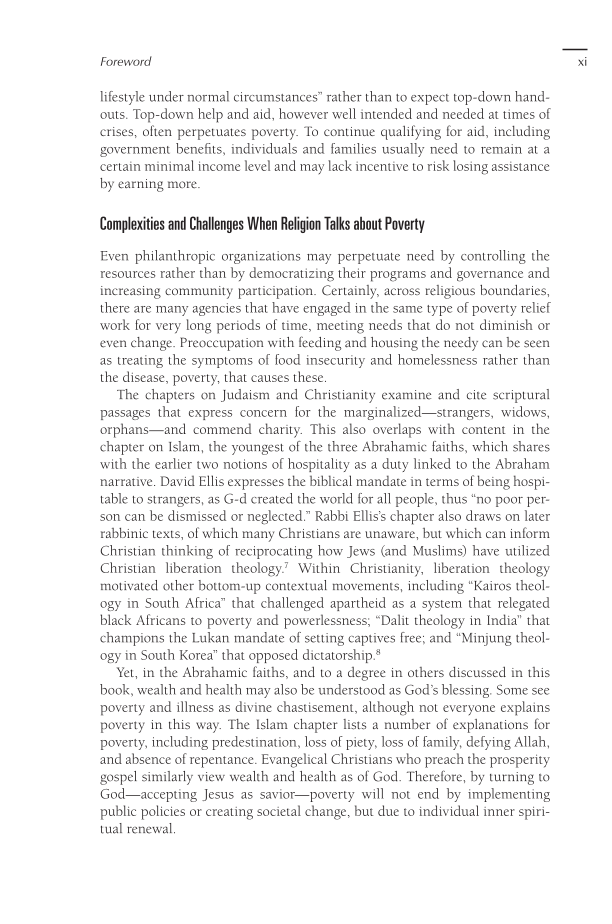Foreword xi lifestyle under normal circumstances” rather than to expect top-down hand- outs. Top-down help and aid, however well intended and needed at times of crises, often perpetuates poverty. To continue qualifying for aid, including government benefits, individuals and families usually need to remain at a certain minimal income level and may lack incentive to risk losing assistance by earning more. Complexities and Challenges When Religion Talks about Poverty Even philanthropic organizations may perpetuate need by controlling the resources rather than by democratizing their programs and governance and increasing community participation. Certainly, across religious boundaries, there are many agencies that have engaged in the same type of poverty relief work for very long periods of time, meeting needs that do not diminish or even change. Preoccupation with feeding and housing the needy can be seen as treating the symptoms of food insecurity and homelessness rather than the disease, poverty, that causes these. The chapters on Judaism and Christianity examine and cite scriptural passages that express concern for the marginalized—strangers, widows, orphans—and commend charity. This also overlaps with content in the chapter on Islam, the youngest of the three Abrahamic faiths, which shares with the earlier two notions of hospitality as a duty linked to the Abraham narrative. David Ellis expresses the biblical mandate in terms of being hospi- table to strangers, as G-d created the world for all people, thus “no poor per- son can be dismissed or neglected.” Rabbi Ellis’s chapter also draws on later rabbinic texts, of which many Christians are unaware, but which can inform Christian thinking of reciprocating how Jews (and Muslims) have utilized Christian liberation theology.7 Within Christianity, liberation theology motivated other bottom-up contextual movements, including “Kairos theol- ogy in South Africa” that challenged apartheid as a system that relegated black Africans to poverty and powerlessness “Dalit theology in India” that champions the Lukan mandate of setting captives free and “Minjung theol- ogy in South Korea” that opposed dictatorship.8 Yet, in the Abrahamic faiths, and to a degree in others discussed in this book, wealth and health may also be understood as God’s blessing. Some see poverty and illness as divine chastisement, although not everyone explains poverty in this way. The Islam chapter lists a number of explanations for poverty, including predestination, loss of piety, loss of family, defying Allah, and absence of repentance. Evangelical Christians who preach the prosperity gospel similarly view wealth and health as of God. Therefore, by turning to God—accepting Jesus as savior—poverty will not end by implementing public policies or creating societal change, but due to individual inner spiri- tual renewal.
Document Details My Account Print multiple pages
Print
You have printed 0 times in the last 24 hours.
Your print count will reset on at .
You may print 0 more time(s) before then.
You may print a maximum of 0 pages at a time.





























































































































































































































































































































































































































































